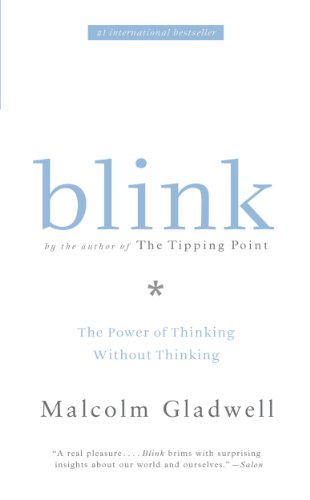

This article is an excerpt from the Shortform summary of "Blink" by Malcolm Gladwell. Shortform has the world's best summaries of books you should be reading.
Like this article? Sign up for a free trial here .
We’re told, “Trust your intuition,” but how do you do it? And is trusting your instincts really better than collecting all the facts and making a conscious, deliberate decision?
Learn why trusting your instincts may be better than making a well-thought-out decision, and learn how to trust your intuition to make better decisions.
Trust Your Intuition: Two Primary Benefits
- Decisions based on trusting your intuition are quick
- Decisions based on trusting your intuition are unconscious
The value of speed is obvious in a situation in which there’s no time to think things through. EMTs, firefighters, and police officers have to trust their guts all the time. But even though we don’t realize it, we’re all making snap decisions constantly, and we all find ourselves in situations where time is limited and we need to act quickly. This is why you should trust your instincts.
The Advantages of Trusting Your Intuition
In addition to being speedy, to trust your intuition is an unconscious process. The unconscious mind handles all the minor bits of information thrown at us every day. This frees up the conscious mind to focus on problems that need our deliberate attention.
Why You Need to Trust Your Intuition: Cases of Ventromedial Damage
Scientists can see how much work the unconscious mind does by observing people with brain damage to the ventromedial prefrontal cortex. This is the area of the brain that makes unconscious decisions.
People with ventromedial damage can’t make snap judgments. Their unconscious minds don’t prioritize information for them. They give equal weight to minor and major details when making a decision. Consequently, they can make decisions, but they do it extremely slowly, due to the inability to tune out distracting information. If you don’t have an intuition that works well, you can’t trust your intuition. You can’t trust your gut.
Additionally, people with ventromedial damage have trouble turning decisions into actions. Without the aid of the unconscious mind, they’re highly rational thinkers and don’t involve their emotions in decision making. This seems like a good thing. We’re often told to leave our emotions out of the decision-making process. But we need an emotional push to get from decisions to actions. If you trust your instincts, you have that extra emotional push.
Without emotion, we may know something is bad for us, but we’ll keep doing it anyway. Especially in stressful situations, emotion (which often comes from the unconscious) gives us the nudge we need to act on decisions.
In summary, if we didn’t have an unconscious mind to prioritize information for us, we’d weigh every detail, relevant or not, before coming to a decision. Further, the resulting decision may not be the best decision, because it likely wouldn’t be based on the most important information.
Just as critical, if we didn’t have an unconscious mind, we may not have the emotional push to act on a decision once we’d made it. Our unconscious mind does a lot of heavy lifting to make smart, actionable decisions. This is why your gut is smart and you should trust your intuition.
How to Better Trust Your Intuition
What if your gut is wrong? What if you trust your intuition and it leads you to make a bad decision? Most of us think we can’t control our instinctive reactions. This assumption is both wrong and defeatist. We can improve our instinctive decision making through deliberate training and by slowing down. As fast as they are, even snap judgments take time. You can better trust your instincts by slowing down the process.
It’s hard to take your time when you’re in a stressful situation. There are two strategies for improving the decisions we make under stress: 1) rehearse, and 2) practice mind-reading. If you do these two things, you’ll feel more confident when you trust your intuition.
Strategy #1: Rehearse
Practice making decisions in environments and circumstances that mimic stressful situations. Rehearse your upcoming job interview or presentation in an environment that mirrors the actual event as closely as possible. Consider factors like the time of day, the people involved, and what you’ll wear. Replicate these details in your rehearsal.
These drills allow you the time to figure out the most appropriate response to the stressor. Then, when you’re actually in a moment of stress, you’ll have practiced the desired response so often that it’s instinctual. You won’t have to make a rational decision in the moment and can rely on your unconscious mind. This a way to inoculate yourself against stress. You can trust your intuition and know that you made the right choice.
Strategy #2: Practice Mind Reading
We read people’s minds by gathering information from their faces. We can get better at understanding others, and consequently make more accurate snap judgments about them, by practicing reading people’s facial expressions. This strategy could help you feel more confident to trust your instincts.
One researcher gauges participants’ mind-reading skills by having them watch a clip of people claiming to have done something. The participant’s job is to figure out which person is lying. Most people have a hard time with this.
But stroke victims and children of abusive parents are really good at picking out the liar. Stroke victims may have trouble communicating and therefore need to become sensitive to non-verbal forms of communication. People who’ve had abusive childhoods may be practiced in reading the mind of an alcoholic parent. These experiences have forced them to become good at reading people’s facial expressions. Consequently, if you’ve had a stroke, you might trust your intuition about people more.
Rehearsing to Better Trust Your Gut
The following examples look at the ways in which police officers and bodyguards have learned to trust their guts in stressful situations. Use similar strategies to improve your instincts so you can trust your intuition.
Training in Reading Micro Expressions
We can all become better at mind reading. Research shows that just a half-hour of practice reading people’s fleeting expressions can improve the mind-reading abilities of law-enforcement agents. If you’re confident in your mind-reading abilities, it will be easier to trust your intuition.
Rehearsals of Stressful Situations
One security firm inoculates its bodyguards against stress by setting up a mock assassination attempt of the person they’re guarding. The firm repeatedly shoots the bodyguards with bullet-like plastic capsules at unexpected times, until the guards are able to function in that environment without getting flustered.
The firm also has its bodyguards repeatedly encounter an aggressive dog and tracks their heart rates (an indicator of stress level). The first time they confront the dog, their heart rates are 175, so high that their vision is impaired. By the fourth time, their heart rates are usually around 110 and they’re able to function under pressure. If you rehearse, in an actual emergency, you can trust your intuition and not worry about stress impairing your decision-making skills.
———End of Preview———

Like what you just read? Read the rest of the world's best summary of "Blink" at Shortform . Learn the book's critical concepts in 20 minutes or less .
Here's what you'll find in our full Blink summary :
- How you can tell if a marriage will fail, within 3 minutes
- Why your first impressions are usually surprisingly accurate
- The dark side to making first impressions, and how to avoid the,






